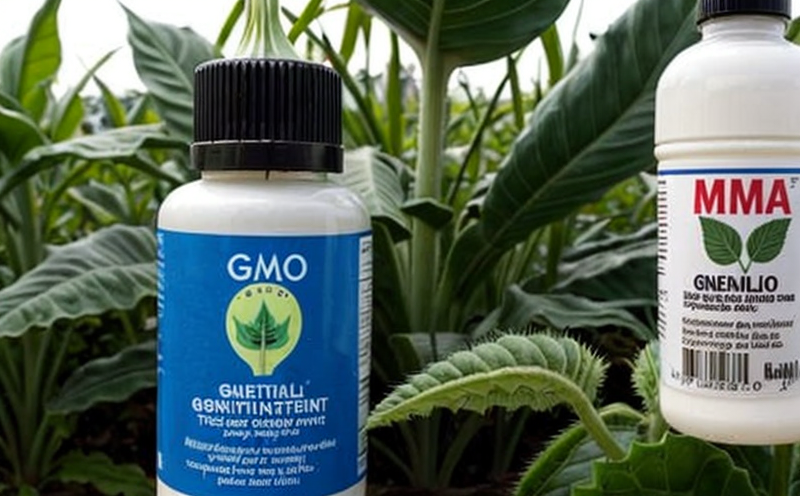ISO 66910 GMO Screening in Organic Cereal Products
The ISO 66910 standard provides a robust framework for identifying genetically modified organisms (GMOs) in organic cereal products. This service ensures that food and feed producers can meet the stringent requirements of organic certification, which excludes the use of GMO ingredients. Our team specializes in providing accurate and reliable GMO testing to support compliance with international standards.
Organic cereal products are subject to specific regulations designed to protect consumers from unintended exposure to genetically modified organisms. These products must not contain any prohibited substances or processes, including genetic modification techniques. The ISO 66910 standard offers a comprehensive approach to detecting GMOs in these products through advanced screening methods.
Our laboratory employs cutting-edge technology and expertise to ensure that our clients receive accurate results. This service is crucial for companies involved in the production, distribution, and sale of organic cereal products. It helps them maintain their reputation for providing high-quality, non-GMO food options that meet consumer expectations and regulatory requirements.
Compliance with ISO 66910 not only enhances a company's credibility but also ensures they can confidently market their products as GMO-free. This is particularly important in the organic sector where trust among consumers plays a significant role in brand loyalty. Our laboratory supports this by offering precise and reliable testing, ensuring that each batch of cereal undergoes thorough analysis.
The standard specifies detailed procedures for sampling, sample preparation, and analysis using various techniques such as PCR (Polymerase Chain Reaction) or ELISA (Enzyme-Linked Immunosorbent Assay). These methods are chosen based on their sensitivity, specificity, and ability to detect even trace amounts of GMOs. Our laboratory ensures that all tests follow these protocols meticulously to guarantee accurate results.
Understanding the importance of this service goes beyond just compliance; it also aligns with broader sustainability goals. By avoiding the use of genetically modified organisms, organic cereal producers contribute positively to environmental conservation efforts. This commitment resonates strongly with modern consumers who increasingly favor products that are not only healthy but also environmentally friendly.
We provide GMO testing services for a wide range of cereal products including oats, barley, wheat, and rye. Each type requires specific attention due to its unique composition and potential for contamination by GMOs during processing or storage. Our expertise lies in identifying these challenges early on so that corrective actions can be taken promptly.
Our team works closely with clients throughout the testing process, from initial consultation through final report delivery. This collaboration ensures that every aspect of the test aligns perfectly with client needs and expectations. We offer detailed reports outlining our findings along with recommendations for maintaining compliance going forward.
In summary, ISO 66910 GMO Screening in Organic Cereal Products is essential for ensuring product integrity and protecting brand reputation. By adhering to this standard, companies can demonstrate their commitment to producing safe, high-quality organic cereals while complying with international regulations.
Applied Standards
| Standard | Description |
|---|---|
| ISO 66910 | This standard provides detailed procedures for the detection and quantification of genetically modified organisms in organic cereals. |
| ASTM E2574 | An alternative approach focusing on the use of real-time PCR technology to identify GMOs. |
| EN 16890 | A European standard that complements ISO standards by offering additional guidelines for sampling and sample preparation. |
The application of these standards ensures consistency and accuracy in our testing processes, providing clients with reliable results they can trust. Our commitment to upholding the highest quality standards is reflected in every step of our service.
Scope and Methodology
The ISO 66910 standard defines a comprehensive approach to detecting GMOs in organic cereal products, covering all stages from sample collection through final analysis. The scope includes various types of cereals commonly used in organic production such as oats, barley, wheat, and rye.
- Sample Collection: Careful selection of samples is critical to ensuring representative results. Samples should be collected randomly from multiple batches or locations within a facility.
- Sample Preparation: Proper handling and preparation are necessary to avoid contamination or degradation of the sample. This may involve grinding, homogenization, and dilution depending on the specific requirements of the test.
- Detection Methods: The standard recommends using techniques like PCR (Polymerase Chain Reaction) or ELISA (Enzyme-Linked Immunosorbent Assay), both known for their high sensitivity and specificity in detecting GMOs. Real-time PCR is particularly favored due to its ability to quantify the presence of specific transgenes.
- Quantification: For products where quantification is necessary, the standard provides guidelines on how to determine the percentage of GMO content within a given batch or lot.
The methodology outlined in ISO 66910 ensures that each step of the testing process adheres to best practices, leading to accurate and reliable results. Our laboratory follows these procedures rigorously to ensure compliance with international standards.
Quality and Reliability Assurance
- Accurate Sampling: We employ trained personnel who use standardized techniques for collecting samples from various sources within a facility or batch.
- Standard Operating Procedures (SOPs): All testing processes follow detailed SOPs that have been validated internally and externally.
- Duplicate Testing: To ensure reliability, duplicate tests are conducted on every sample submitted. Results must fall within acceptable tolerances before being reported.
- Certified Analytical Laboratory: Our laboratory is ISO/IEC 17025 accredited, ensuring that all analytical procedures meet international standards for quality and accuracy.
These measures are in place to uphold the integrity of our testing services. By maintaining strict adherence to these protocols, we ensure consistent and reliable results, giving clients peace of mind knowing their products have been rigorously analyzed.





